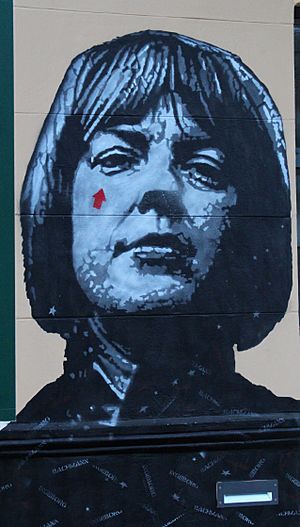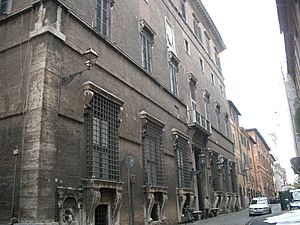Ingeborg Bachmann facts for kids
Quick facts for kids
Ingeborg Bachmann
|
|
|---|---|

Graffiti portrait of Bachmann at the Robert Musil Museum in Klagenfurt
|
|
| Born | 25 June 1926 Klagenfurt, Austria |
| Died | 17 October 1973 (aged 47) Rome, Italy |
| Notable works | Malina (1971) |
| Notable awards | Prize of the Group 47 1953 Georg Büchner Prize 1964 Anton Wildgans Prize 1971 |
| Partner | Paul Celan (1950–52, 1957) Max Frisch (1958–63) |
| Signature | |
Ingeborg Bachmann (born June 25, 1926 – died October 17, 1973) was an important Austrian poet and writer. She is known for her deep thoughts and unique way of writing. Her works often explored ideas about truth, language, and the challenges faced by women in society.
Contents
Early Life and Education
Ingeborg Bachmann was born in Klagenfurt, a city in Carinthia, Austria. Her father, Matthias Bachmann, was a schoolteacher. She had a sister named Isolde and a brother named Heinz.
She studied many subjects at different universities, including Innsbruck, Graz, and Vienna. She studied philosophy (the study of big questions about life), psychology (the study of the mind), German philology (the study of language and literature), and law. In 1949, she earned her PhD (a high university degree) from the University of Vienna. Her main paper was about the ideas of a philosopher named Martin Heidegger.
Career
After finishing her studies, Bachmann worked at a radio station called Rot-Weiss-Rot. She wrote scripts and edited programs. This job helped her learn about new literature and gave her enough money to focus on her own writing. The station even published her first radio dramas (plays written for radio).
Her writing career grew when she met other writers, especially through a group called Gruppe 47. Famous writers like Paul Celan and Günter Grass were also part of this group.
In 1953, she moved to Rome, Italy. She spent many years there writing poems, essays, and short stories. She also wrote libretti (the words for operas) with composer Hans Werner Henze. Her work quickly became famous around the world, and she won many awards. From 1958 to 1963, she lived with Swiss writer Max Frisch. Her 1971 novel, Malina, is sometimes seen as a response to his novel Mein Name sei Gantenbein.
Writings
Bachmann's writing often explored themes like personal boundaries and finding the truth. She was also very interested in the philosophy of language, which is about how language shapes our thoughts and reality.
Many of her stories show the struggles of women trying to live and be heard in society after World War II. She also wrote about the history of imperialism and fascism. Fascism, a type of strict and controlling government, was a common topic in her works. In her unfinished novel Der Fall Franza (The Case of Franza), she suggested that fascism didn't truly end in 1945. She believed it continued to exist in how people treated each other, especially in how men treated women.
Bachmann was one of the first Austrian women writers to connect her personal experiences with bigger political ideas. Her writings, along with those of other Austrian women writers, became very popular in Germany. After her death in 1973, other Austrian writers like Thomas Bernhard and Elfriede Jelinek continued her important work.
Lectures
Between 1959 and 1960, Ingeborg Bachmann gave five important talks about writing at the Goethe University Frankfurt. These talks, known as the Frankfurt Lectures, are central to understanding her ideas. In them, she explained the main themes in her early works and discussed the role of literature in society.
In her first lecture, she asked big questions like: Why do writers write? What changes do we want to see through art? She believed that the best writing of the 20th century brought new ideas and a "new spirit" through language.
In her second lecture, she talked about poems. She said that poetry has a special power to understand reality. She mentioned poets who aimed to lead the world to a "purer heaven of art." She also stressed that writers should not stay silent about the wrongs in the world.
Her third lecture was about the "writing 'I'" – how authors use the first person ("I") in their stories. She explored how the narrator's voice can change how a story is told.
In the fourth lecture, she discussed how names are used in literature. She looked at how names can have their own meaning or how characters might not even have a name, like in some of Kafka's stories.
Her fifth lecture was about "Literature as Utopia." She believed that literature is "utopian" because it makes both the writer and the reader think about what is missing in the world. She argued that literature can inspire us to work towards a better future.
Later Life and Death
On September 25, 1973, Ingeborg Bachmann's nightgown caught fire. She was taken to the hospital for severe burns. Police believed the fire was caused by a cigarette. She passed away on October 17, 1973.
Legacy
After her death, Ingeborg Bachmann became very popular among feminist readers. Her work helped inspire a new movement called Frauenliteratur (women's literature), which aimed to find and share authentic female voices in writing. Many scholars began to study her prose work more deeply.
Awards and Recognition
- 1953: Prize of Group 47, for her poetry collection Die gestundete Zeit
- 1964: Georg Büchner Prize
- 1971: Anton Wildgans Prize
The Ingeborg Bachmann Prize
The Ingeborg Bachmann Prize is a famous award given every year in Klagenfurt, Austria. It is named after her and has been awarded since 1977.
In Film
The Dreamed Ones (2016) is a film based on the letters exchanged between Bachmann and poet Paul Celan over nearly 20 years.
A biopic (a movie about a real person's life) called Ingeborg Bachmann – Journey into the Desert was released in 2023. It stars Vicky Krieps as Bachmann and focuses on her relationship with Max Frisch. It also shows her travels with friends to the desert in Egypt.
Personal Life
Ingeborg Bachmann had relationships with writer Max Frisch and poet Paul Celan. She never married or had children.
Works
Poetry collections
- 1953: Die gestundete Zeit
- 1956: Anrufung des Grossen Bären
Radio plays
- 1952: Ein Geschäft mit Träumen
- 1955: Die Zikaden
- 1959: Der gute Gott von Manhattan (won an award)
Libretti
- 1960: Der Prinz von Homburg
- 1965: Der junge Lord
Collections of short stories
- Das dreißigste Jahr (1961)
- Simultan (1972)
Novel
- Malina (1971)
Unfinished novels
- Der Fall Franza / Requiem für Fanny Goldmann (published in 1979 after her death)
Essays and public speeches
- 1959: Die Wahrheit ist dem Menschen zumutbar (a speech about poetry)
- 1955: Frankfurter Vorlesungen (lectures on modern literature)
Images for kids
See also
 In Spanish: Ingeborg Bachmann para niños
In Spanish: Ingeborg Bachmann para niños
- List of Austrian writers
- List of Austrians
 | Georgia Louise Harris Brown |
 | Julian Abele |
 | Norma Merrick Sklarek |
 | William Sidney Pittman |


